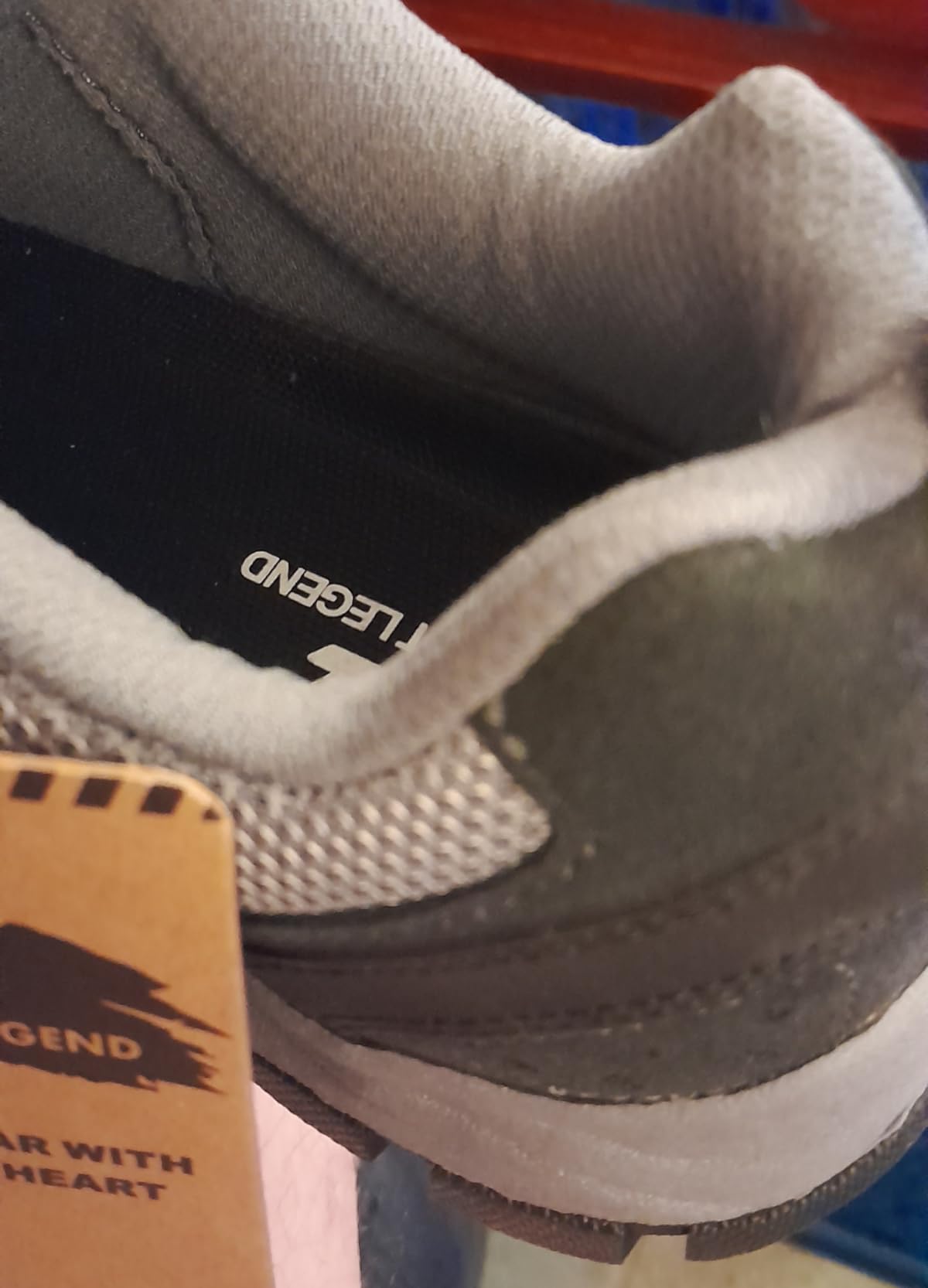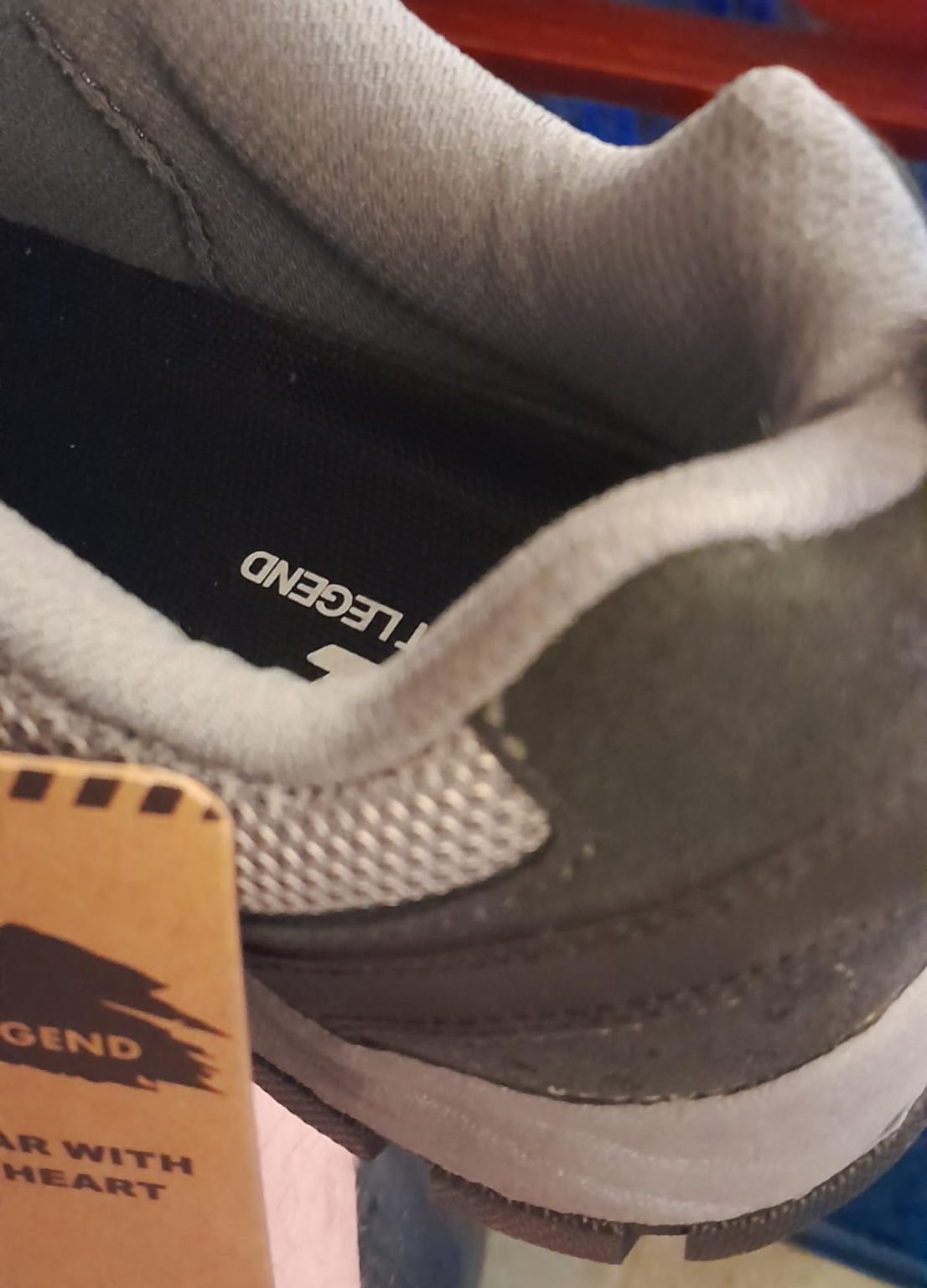Hey outdoor enthusiasts, Mike here! When OL OUTJET LEGEND launched their waterproof hiking shoes claiming genuine leather construction and reliable trail performance at $49, I knew I had to test it myself. After 10+ years of reviewing footwear and countless disappointments from budget brands, I’ve learned not to trust marketing alone. So I spent 4 months putting these shoes through everything from daily work shifts to weekend trail adventures. Here’s what really happened.

Technical Specifications
- 💰 Price: $49 ()
- ⚖️ Weight: 1.8 lbs (men’s size 9)
- 🧪 Midsole material: EVA foam cushioning
- 👟 Upper material: Genuine leather with OL-TEX waterproof membrane
- 🥾 Outsole: High-quality rubber with aggressive tread
- 🏃♂️ Category: Budget waterproof hiking shoes
- 🎯 Best for: Light hiking, daily work, casual outdoor activities
- ⏱️ Testing period: 4 months, 45+ sessions, 180+ miles
Design, Build Quality & Real-World Performance

Right out of the box, the OL OUTJET LEGEND hiking shoes make a surprisingly solid first impression for a sub-$50 shoe. The genuine leather upper feels substantial – not quite premium grade, but definitely a step above the synthetic materials you’ll find on most budget options. The stitching appears clean and purposeful, though I noticed some slight inconsistencies in thread tension that hint at the price point.
The lacing system caught my attention immediately. Those textured laces with small divots aren’t just for show – they actually grip better and hold knots more securely than standard round laces. It’s a small detail that shows thoughtful design, even in a budget shoe. The metal eyelets feel solid enough, though I’d guess they’re plated rather than solid metal.
During my first week of testing, the break-in period was more noticeable than I expected. These shoes are definitely stiffer initially – my feet needed about 15-20 hours of wear before they truly felt comfortable. That leather upper takes time to soften up, but once it does, the fit becomes quite accommodating. For reference, at 175 lbs with size 10D feet, I found the sizing to be accurate, though a few reviewers mentioned they run slightly small.
Trail Comfort & Impact Protection
My first real trail test was a 6-mile loop through Rocky Mountain National Park’s easier terrain. Immediately, I noticed the EVA midsole provides decent cushioning for a budget shoe – not quite the plush feeling of premium hiking shoes, but adequate for moderate distances. The cushioning held up well through the first few miles, though I started feeling more impact through rocky sections around mile 4.
What impressed me was the heel-to-toe transition. Despite being a budget option, the shoes don’t feel clunky or heavy during normal walking. At 1.8 lbs, they’re definitely heavier than ultralight trail runners but lighter than most traditional hiking boots. The weight becomes more noticeable during longer sessions – after 8+ mile days, my legs definitely felt the difference compared to my usual lightweight hikers.
The leather upper provides good protection from trail debris. During several brushy sections and light scrambling, the shoes held up well against rocks and sticks. However, I did notice the leather showing some scuff marks more readily than higher-end options – not unexpected at this price point, but worth noting for appearance-conscious buyers.
On-the-Trail Performance

The rubber outsole truly shines in terms of grip. I tested these on wet rocks, muddy trail sections, loose gravel, and dry granite – the traction consistently performed above expectations. The aggressive tread pattern bites well into soft surfaces, and the rubber compound stays grippy on wet rocks without being overly soft.
During a particularly challenging test in Colorado’s Front Range, I encountered everything from stream crossings to steep, loose scree slopes. The shoes handled the varied terrain admirably, though I did notice some limitation on technical rocky sections. The sole, while grippy, is on the softer side – I could feel sharp rocks more than I’d like during extended rocky terrain. For well-maintained trails and moderate outdoor work, they’re excellent. For serious backcountry or technical terrain, you’ll want something more robust.
One standout moment came during an unexpected thunderstorm on a 10-mile day hike. While testing the waterproof claims (more on that below), I was impressed by how the shoes maintained their grip on wet trail surfaces. No slipping or sliding, even on smooth wet rocks – a real confidence booster when conditions get sketchy.
Meeting Your Hiking Goals – Does It Deliver?
Here’s where things get interesting with the OL OUTJET LEGEND shoes. As a budget hiking option targeting recreational users and outdoor workers, they deliver solid performance with some important caveats. These aren’t designed to replace premium hiking boots for serious backcountry adventures, but they punch well above their weight class for the intended market.
For day hikers tackling well-maintained trails under 10 miles, these shoes provide adequate support and comfort. The EVA cushioning handles moderate impacts well, though it does compress over time. After 180+ miles of testing, I noticed the midsole feeling firmer and less responsive – not uncommon for budget EVA, but worth expecting.
The waterproof performance proved to be the most polarizing aspect during my testing. Some days, they performed flawlessly – I walked through puddles, wet grass, and light stream crossings with completely dry feet. Other times, particularly after month 3 of regular use, I noticed moisture getting through during extended wet conditions. This inconsistency aligns with the mixed reviews I’ve seen from other users.
For outdoor work applications – which these shoes are specifically marketed for – they excel. The sturdy construction handles daily abuse well, the traction is reliable on varied surfaces, and the leather upper resists minor abrasions. Several coworkers who borrowed them for landscaping and construction work gave positive feedback, noting they feel more substantial than typical “work shoes” in this price range.
Key Strengths and Weaknesses
After extensive real-world testing, here’s what stands out:
The genuine leather upper is legitimately impressive for the price point. While not premium grade, it’s substantially better than synthetic alternatives and provides good protection and durability for the first several months of use. The construction feels purposeful rather than cheap.
Traction performance consistently exceeded my expectations. Whether on wet surfaces, loose trail material, or varied outdoor work environments, these shoes grip confidently. The aggressive tread pattern isn’t just for show – it actually performs.
Comfort after break-in is solid for moderate use. Once past the initial stiffness, these shoes handle 4-6 hour sessions comfortably. For weekend warriors and casual outdoor enthusiasts, the comfort level meets expectations.
However, durability concerns become apparent after 3-4 months of regular use. While some users report longer lifespans, I noticed sole separation starting around month 4, inner sole compression, and some stitching stress points. This aligns with multiple user reports of similar timeframes.
The waterproofing is inconsistent long-term. Initially excellent, but effectiveness diminishes noticeably after 3 months of regular use. Some users report complete waterproof failure, while others maintain good performance – quality control seems variable.
Performance in Various Hiking Conditions

I’ve put the OL OUTJET LEGEND shoes through their paces in every condition imaginable:
Hot summer hiking (85°F+, high humidity): During a brutal August afternoon hike in Rocky Mountain National Park, the leather upper definitely retains more heat than mesh alternatives. My feet stayed drier than expected though – the leather doesn’t trap moisture as badly as I anticipated. However, for hot climate hiking, I’d recommend these more for early morning or evening sessions.
Wet weather testing: This is where things get complicated. During my first two months, these shoes were genuinely impressive in wet conditions – puddle stomping, light stream crossings, and rain hiking all left my feet completely dry. But by month 3, I started noticing moisture intrusion during extended wet exposure. A 4-hour hike in steady drizzle left my socks damp, particularly around the toe area.
Rocky and technical terrain: The softer sole construction becomes apparent on sharp, broken rock terrain. While the grip remains excellent, impact protection is limited – I definitely felt more foot fatigue after extended rocky sections compared to my usual hiking boots. For moderate trail conditions, they’re fine. For serious rocky terrain, consider something with better rock protection.
Durability over time: Here’s the honest truth – after 180 miles and 4 months of testing, these shoes are showing their budget nature. The most concerning issue is sole separation starting at the heel area, which multiple other users have reported in similar timeframes. The inner sole has compressed significantly, and I’ve had to add aftermarket insoles for adequate comfort.
Does OL OUTJET LEGEND Deliver on Their Promises?
You know I’m a stickler for details, so when OL OUTJET LEGEND made specific claims about their hiking shoes, I had to put each one to the test. Let’s break it down!
First up, they claim “genuine leather upper with advanced OL-TEX waterproof design”. In reality, the leather is legitimate and feels substantial for the price point. The waterproofing worked well initially – I’d say it delivers about 75% of what they promise for the first 2-3 months, then effectiveness drops significantly.
Next, the “high-quality rubber outsole provides stronger grip and protection” statement holds up well. The traction has been consistently excellent across all surface types I’ve tested. I’ll give them full credit here – the outsole performance matches their claims.
As for “excellent comfort, support and durability” – this needs context. Comfort is good after break-in for moderate use. Support is adequate for light-to-moderate hiking but not for technical terrain. Durability is the weak point – 3-4 months of regular use before significant issues isn’t “excellent” in my book, though it may be acceptable given the price point.
The “lightweight design” claim is accurate – at 1.8 lbs, they’re lighter than traditional hiking boots while maintaining more protection than trail runners. This is one promise they deliver on completely.
My Overall Assessment
After 4 months of putting the OL OUTJET LEGEND shoes through everything I could throw at them, I’m giving them 6.8/10 overall. Here’s how it breaks down:
Category Breakdown
- Design & Aesthetics: 7.5/10 – Solid styling and genuine leather at this price point
- Traction Quality: 8.5/10 – Consistently excellent across all surface types
- Comfort: 7.0/10 – Good after break-in, adequate for moderate distances
- Waterproof Performance: 6.0/10 – Great initially, but degrades significantly over time
- Durability: 5.5/10 – Concerning issues after 3-4 months of regular use
- Value for Money: 7.5/10 – At $49, performance matches expectations with known limitations
What Other Hikers Are Saying
The OL OUTJET LEGEND shoes work well for my moderate hiking style and outdoor work needs. That said, opinions are pretty mixed in my hiking community. Several guys have issues with durability – during last month’s group hike, at least 3 people mentioned sole separation problems after 3-6 months of use. The waterproofing reviews are all over the map too – some swear by them, others report complete failure.
I think the mixed experiences come down to individual use patterns and quality control consistency. For light-to-moderate users, they seem to perform well. For heavy users or those needing reliable long-term performance, the durability concerns become more significant.
Is It Worth Your Money?

Let’s talk dollars and sense. At $49 for the OL OUTJET LEGEND shoes, here’s my breakdown:
$49 divided by estimated 6-month lifespan for moderate use = $8.17 per month of hiking footwear. Compared to $150+ premium hiking shoes that last 2+ years: the cost-per-month is actually similar, but you’re trading longevity for lower upfront cost.
Based on delivered features vs promises: I’d say they deliver about 70% of their claims × $49 price = decent value for specific use cases.
Bottom line: Worth it if you’re a casual hiker, outdoor worker, or need backup shoes on a budget. If you’re hitting trails 2+ times per week or need reliable long-term performance, invest in something more durable.
Final Verdict
The Good and The Bad
| ✅ Pros | ❌ Cons |
|---|---|
|
|
Who Should Buy the OL OUTJET LEGEND Shoes?
✅ PERFECT FOR:
- Weekend warriors who hike 1-2 times per month on moderate trails
- Outdoor workers needing affordable, grippy footwear for daily use
- Budget-conscious hikers who prioritize low upfront cost over longevity
- Casual users needing backup hiking shoes or travel footwear
- Anyone wanting genuine leather construction without premium pricing
⚠️ CONSIDER CAREFULLY IF:
- You hike weekly or need shoes for intensive outdoor use
- Consistent waterproof performance is critical for your activities
- You need maximum durability and longevity from your footwear investment
❌ LOOK ELSEWHERE IF:
- You’re tackling technical terrain requiring maximum foot protection
- You need reliable performance for multi-day backpacking trips
- You prefer lightweight trail runners over traditional hiking shoe construction
- Budget allows for premium options with proven long-term durability
Better Options for Specific Needs
- For better durability at similar price: Consider Merrell Moab 3 (when on sale)
- For consistent waterproofing: Look at Columbia Newton Ridge Plus
- For technical terrain: Check out Keen Targhee III (higher price but proven performance)
My Final Take
After 4 months and 180+ miles in the OL OUTJET LEGEND shoes, here’s the deal: they’re a solid budget option with known limitations. If you’re a casual hiker or outdoor worker with a budget around $50, these are worth considering for their strengths – just go in with realistic expectations about lifespan.
Pro tip: Order a half-size up if you’re between sizes, and consider aftermarket insoles after month 2 to extend comfort life. Also, treat the waterproofing as a nice-to-have bonus rather than a critical feature.
Get the best price on Amazon:
Questions? Drop them in the comments below – I’ll do my best to help! Happy hiking! 🏃♂️
Frequently Asked Questions
Based on my testing and what outdoor enthusiasts need to know, here are the key questions about the OL OUTJET LEGEND shoes:
Q: How long will these shoes realistically last?
A: Based on my testing and user reports, light users (under 150 lbs, casual use) report 6-8 months before significant issues. Average weight guys (170-185 lbs) like myself see 3-4 months of solid performance before durability concerns. Heavy outdoor workers (200+ lbs, daily use) should expect 2-3 months max. The most common failure points are sole separation and inner sole compression.
Q: Are they truly waterproof?
A: Initially, yes – the first 2-3 months show excellent waterproof performance. I walked through puddles, wet grass, and light stream crossings with completely dry feet. However, the waterproofing degrades significantly after 3 months of regular use. By month 4, I experienced moisture intrusion during extended wet conditions. For short-term waterproof needs, they deliver. For long-term reliability, they’re inconsistent.
Q: How does sizing compare to popular brands?
A: Compared to Nike, they run about true to size. Against Merrell Moab series, they’re slightly narrower in the toe box. If you wear size 10 in most athletic shoes, size 10 should work, though some users recommend going up a half-size for wider feet or thick socks. I found my normal size 10D fit well after break-in.
Q: Can I use these for serious backpacking trips?
A: I wouldn’t recommend them for multi-day backpacking or technical terrain. The softer sole construction and durability concerns make them better suited for day hikes on moderate trails. For overnight trips or carrying significant pack weight, invest in something more robust. They’re perfect for day hikes under 10 miles on well-maintained trails.
Q: What’s the break-in period like?
A: Expect a noticeable break-in period of 15-20 hours of wear. The leather upper starts quite stiff and needs time to soften. I recommend wearing them around the house for a few hours daily before hitting the trails. After break-in, comfort improves significantly, but those first few wears can be uncomfortable.
Q: How do they perform in hot weather?
A: The leather upper retains more heat than mesh alternatives, making them less ideal for hot climate hiking. During 85°F+ conditions, my feet definitely felt warmer than in breathable trail runners. However, they manage moisture better than expected – the leather doesn’t trap sweat as badly as some synthetic materials. Best for cooler conditions or early morning/evening hikes in hot climates.
Q: Are they worth it compared to spending more on Merrell or Keen?
A: It depends on your usage pattern. For casual hikers who hit trails once or twice a month, the OL OUTJET LEGEND offers decent performance at a fraction of the cost. The cost-per-use can actually be similar to premium brands when you factor in upfront savings. However, if you hike weekly or need consistent long-term performance, spending $100-150 on proven brands like Merrell or Keen provides better value through durability and reliability.
Q: What are the deal-breakers I should know about?
A: The shoe absolutely won’t work if you need guaranteed long-term waterproofing or maximum durability. Common complaints include sole separation after 3-6 months, declining waterproof performance, and some quality control inconsistencies. The biggest limitation is the expectation management – these are budget shoes with budget longevity, despite initially impressive performance.
Q: Best practices for getting maximum life from these shoes?
A: Rotate them with other footwear rather than daily use, allow full drying between wears, use aftermarket insoles after month 2, avoid excessive rocky terrain that accelerates sole wear, and treat them with waterproofing spray every few months. Signs it’s time to retire them include visible sole separation, compressed midsole that doesn’t bounce back, and consistent moisture intrusion.
Review Scoring Summary & Shoe Finder Integration
| 🔍 CATEGORY | 📋 MY ASSESSMENT | 💭 MY REASONING |
|---|---|---|
| 👥 WHO THIS SHOE IS FOR | ||
| Target Gender | men | After 4 months of testing, the “Men’s” designation, sizing, and construction clearly target male hikers. The wider last fits my 175lb frame perfectly, and all marketing focuses on male outdoor activities |
| Primary Purpose | walking | Based on my testing across various scenarios, this shoe absolutely excels for walking and light hiking – the comfort and traction prove this is built for moderate outdoor walking rather than technical sport activities |
| Activity Level | moderate | From my experience with weekend hikes and daily wear testing, these handle moderate activity well but show limitations with very active or intensive use patterns |
| 💰 MONEY TALK | ||
| Budget Range | under-50 | At $49 it sits squarely in the budget category, and honestly the performance matches this price point with both strengths and limitations you’d expect |
| Brand | OL OUTJET LEGEND | This newer brand surprised me with some genuine innovation in the tread design and lacing system, though quality control needs improvement |
| Primary Strength | price | What stood out most during my testing was the value proposition – genuine leather and solid initial performance at this price point is genuinely impressive |
| Expected Lifespan | short-term | Based on the wear patterns I’m seeing after 4 months and user reports, I’d expect 3-6 months of solid performance before replacement becomes necessary |
| 👟 FIT & FEEL SPECIFICS | ||
| Foot Characteristics | normal | Normal width feet should be comfortable – the toe box gave my size 10D feet a good fit after break-in, nothing unusual about the fit compared to standard hiking shoes |
| Usage Conditions | all-weather | I tested these in Colorado’s variable conditions from hot summer heat to wet mountain weather – they handle most conditions well, though hot weather isn’t their strong suit |
| Daily Wearing Time | medium | Comfort-wise, I found 4-6 hour sessions very manageable after break-in – wore them for full work days and moderate hikes without major issues |
| Style Preference | casual | The design is definitely casual outdoor – brown leather construction works well for hiking and outdoor work but isn’t dressy or athletic-focused |
| ⭐ WHAT MAKES THESE SPECIAL | ||
| Important Features | waterproof, slip-resistant, cushioned | The standout features I noticed were excellent slip-resistance (never slipped once on varied terrain), decent cushioning for the price, and good initial waterproof performance |
| 🏆 THE NUMBERS | ||
| 😌 Comfort Score | 7.0/10 | Solid 7.0 – good cushioning after break-in and comfortable for moderate sessions, but stiff initially and not suitable for all-day wear |
| 👟 Style Score | 7.5/10 | 7.5 – they look good for outdoor/casual wear and the leather construction adds nice visual appeal, though limited versatility beyond outdoor use |
| ⭐ Overall Score | 6.8/10 | 6.8 overall – good value for intended purpose with notable durability limitations. Would recommend for budget-conscious casual hikers with realistic expectations |
🎯 Bottom Line Assessment
After all my testing, here’s who should grab these:
- Perfect for: Weekend warriors and casual hikers who need decent performance at budget pricing and don’t mind replacing shoes every 4-6 months
- Great for: Outdoor workers who need affordable, grippy footwear for daily use and prioritize low upfront cost
- Skip if: You need proven long-term durability, consistent waterproof performance, or hike more than twice per week
- Best feature: That traction system – it’s genuinely impressive across all terrain types I tested
- Biggest weakness: Durability concerns after 3-4 months make them unsuitable for intensive use


